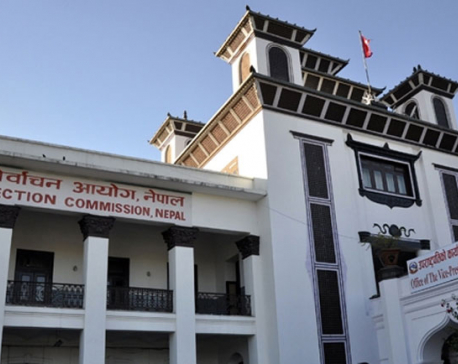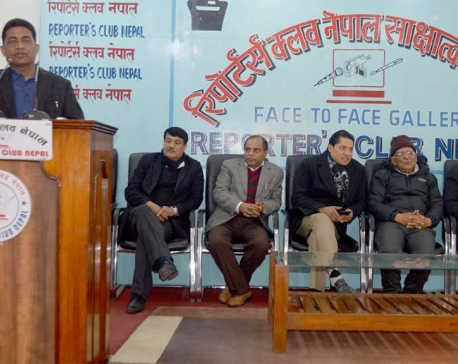
OR
With 3 days remaining of PM's deadline, govt agencies expedite road repair
Published On: July 28, 2017 12:30 AM NPT By: Republica | @RepublicaNepal
KATHMANDU, July 27: The government has claimed that fixing potholes and repairing roads inside the Kathmandu Valley has been expedited following the direction from the prime minister last week.
The Division Road Office, Teku, has submitted the progress report to the Prime Minister's Office mentioning the detailed condition of 22 various road sections inside the Kathmandu valley. According to the report, the repairing of bumpy roads inside the Valley will be concluded by the end of this month.
“We have mobilized the agencies concerned on a war footing to fix the potholes, manage the dusty and muddy roads and maintain the roads after expansion,” said Joint Secretary at the Prime Minister's Office, Damodar Regmi.
Earlier, Prime Minister Sher Bahadur Deuba had instructed the three government secretaries concerned to fix the potholes of Kathmandu roads within 15 days on July 16.
The PM had issued the direction following the death of a school girl who was drowned in a sewage drain in Kathmandu.
“We have completed the maintenance of 60 to 70 percent of the problematic road sections by Thursday. We aim to make it 100 percent by Monday. If in case we can't, the process will not be stopped even after the deadline,” said Regmi.
According to the progress report provided by the PM's office, the DAO has claimed that the condition of various 17 road section is in good condition. The office has claimed that blacktopping or graveling of most of the bumpy road section is underway and is expected to conclude by the end of this month.
“Kathmandu Upatyaka Khanepani Limited and Department of Water Supply and Sewage have been asked to fix the sewage leakage in 22 places inside Kathmandu by Monday,” said Joint Secretary Regmi.
The office has mobilized separate teams comprising an engineer, two sub-engineers and four to five length workers along with a mini dumper machine.
DAO, Kathmandu Valley Road Improvement Project, Project Implementation Directorate and DAO Lalitpur have been working to repair the roads.
You May Like This

EC writes to govt to expedite steps for remaining polls
KATHMANDU, July 5: The Election Commission has suggested to the government not to split the existing wards of local units while... Read More...

Govt extends taskforce deadline by 7 days
KATHMANDU, Feb 21: The government has extended the deadline of the taskforce formed to study the report prepared by the local... Read More...

Govt will announce date for elections within 10 days: PM’s Political Advisor Khanal
KATHMANDU, Jan 12: Chief Political Advisor of Prime Minister Pushpa Kamal Dahal Chakrapani Khanal has said that the government is... Read More...







Just In
- NRB to provide collateral-free loans to foreign employment seekers
- NEB to publish Grade 12 results next week
- Body handover begins; Relatives remain dissatisfied with insurance, compensation amount
- NC defers its plan to join Koshi govt
- NRB to review microfinance loan interest rate
- 134 dead in floods and landslides since onset of monsoon this year
- Mahakali Irrigation Project sees only 22 percent physical progress in 18 years
- Singapore now holds world's most powerful passport; Nepal stays at 98th











Leave A Comment